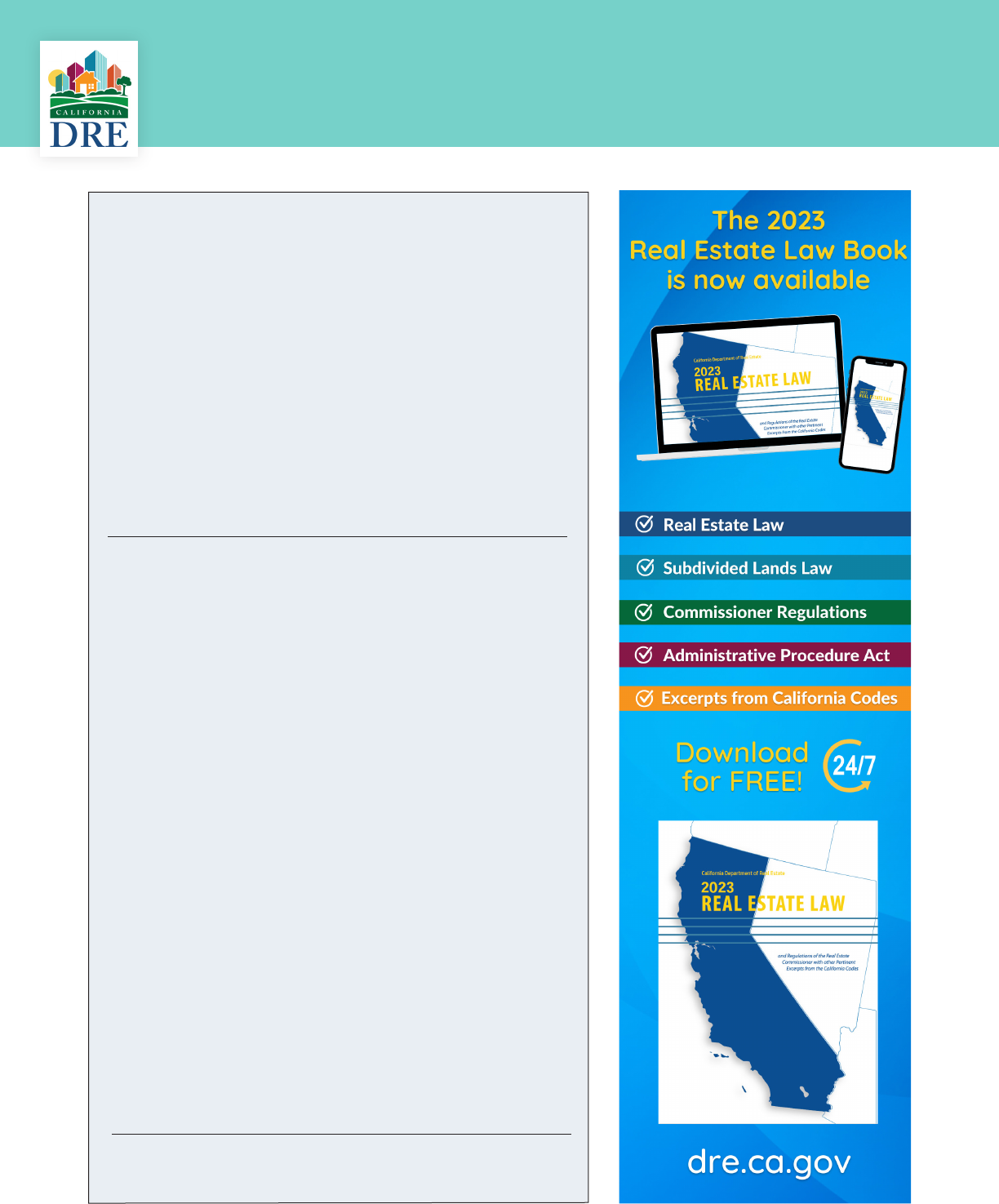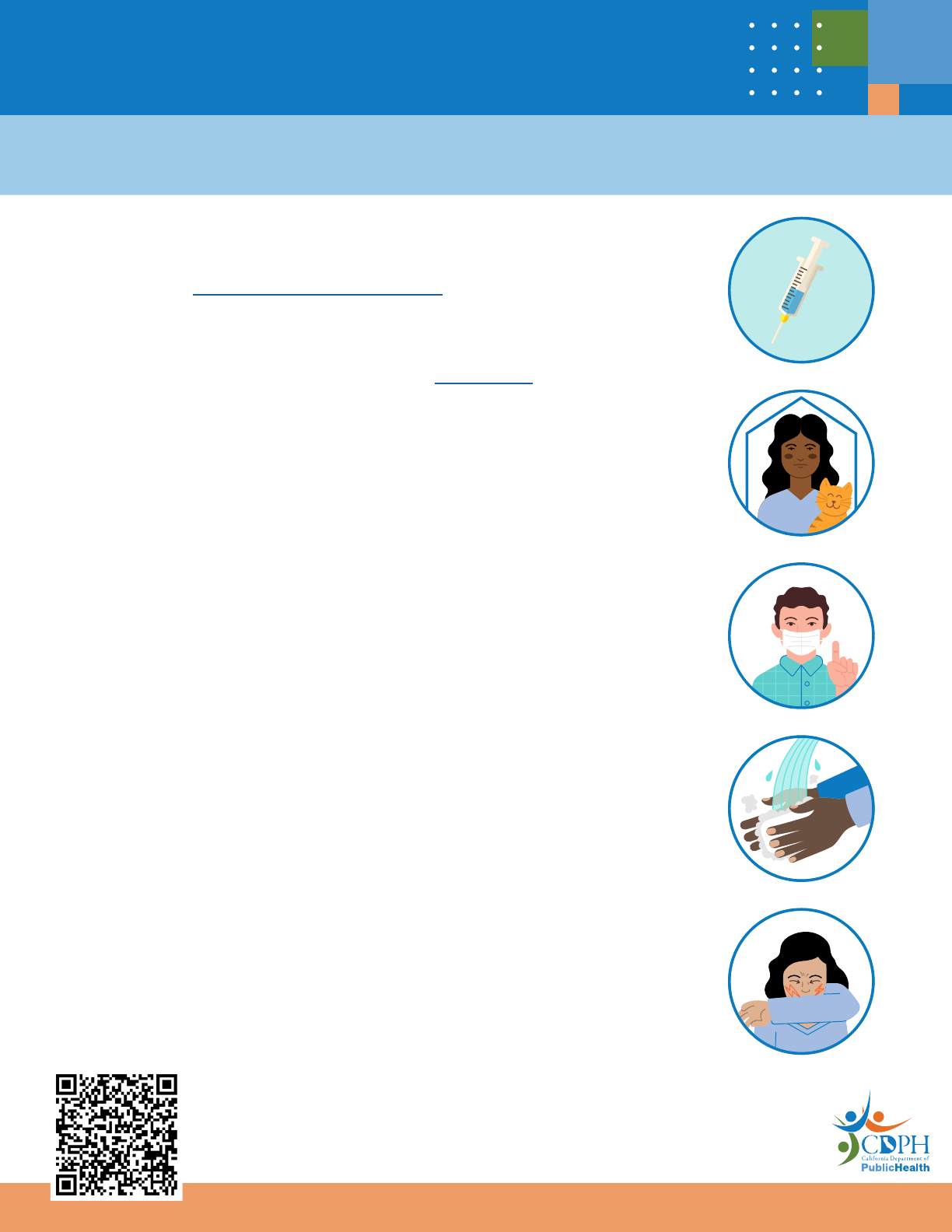
Real Estate Bulletin
www.dre.ca.gov
e gateway into many occupations is a licensing exam. In real estate, this right of passage is the
culmination of having taken required coursework and engaging in rigorous preparation.
Department of Real Estate exams are scientifically (actually, psychometrically) designed to measure a
very precise point at which an examinee is sufficiently competent to provide real estate services consistent
with Real Estate Law. is standard is often described as “entry level competence.” A valid exam will be
sufficiently surgical to identify that point between those who possess the minimum level of competency
and those who are close, but fall short.
Often exams are simply considered a tool to measure whether examinees have adequate knowledge,
skills, and abilities. But, ultimately, the entire basis for regulating a profession and offering a licensing
examination is to protect consumers.
A typical model of consumer protection relies on a robust enforcement program. And, our talented
team of investigators and attorneys work tirelessly to collect and review evidence, interview parties to
transactions, and prepare for and advocate in hearings. All of this crucial work takes place subsequent to
consumer harm.
Commissioner’s Update
Real Estate Commissioner
Douglas R. McCauley
P.4 Summary of New Real Estate Laws | P.5 Fiduciary Duty to Borrowers and Steering Prohibitions
(CONTINUED ON PAGE 3)
DEPARTMENT OF REAL ESTATE
Winter 2023 Vol. 82, No. 1
New Pre-License Education Requirements Coming January 2024
Senate Bill 1495 (SB 1495), signed by Governor Gavin Newsom in September 2022, makes changes to the course content of
the real estate practice class required of new real estate license applicants. SB 1495 takes effect on January 1, 2024.
Currently, all applicants for the salesperson or broker examination must complete a three semester or quarter equivalent course
in real estate practice to qualify for the exam. Beginning January 1, 2024, these applicants will need to complete a revised
course in real estate practice that includes the following content:
• A component on implicit bias, including education about the impact of implicit bias, explicit bias, and systemic bias
on consumers, the historical and social impacts of those biases, and actionable steps students can take to recognize and
address their own implicit biases.
• A component on the application of federal and state fair housing laws to the practice of real estate. e fair housing
component must include an interactive participatory component, during which the applicant engages in role-play as both
a consumer and a real estate professional.
ese new requirements effect individuals who submit an application received by DRE on or after January 1, 2024, to take
either the real estate broker or the salesperson examination.
Over the next year, DRE will work with California state colleges and universities, as well as with DRE course providers, to
ensure that the new course meets the legislative requirements. We will post further updates about this topic on the DRE
website.
g

DEPARTMENT OF REAL ESTATE
2
REAL ESTATE BULLETIN
Official Publication of the California
Department of Real Estate
Vol. 81, No. 4 – Winter 2023
STATE OF CALIFORNIA
Gavin Newsom, Governor
BUSINESS, CONSUMER SERVICES
AND HOUSING AGENCY
Lourdes M. Castro Ramírez, Secretary
DEPARTMENT OF REAL ESTATE
Douglas R. McCauley, Real Estate
Commissioner
REAL ESTATE BULLETIN STAFF
Claire Goldstene
Bradley Evans
Joanne Van
DRE ADMINISTRATION
Marcus McCarther, Chief Deputy
Commissioner
Stephen Lerner, Assistant Commissioner,
Legal Aairs
Rick Lopes, Assistant Commissioner,
Communications and Publications
Calvin McGee, Assistant Commissioner,
Information Technology
Chris Neri, Assistant Commissioner,
Subdivisions
Jeff Oboyski, Assistant Commissioner,
Licensing
Sonja Palladino, Assistant Commissioner,
Legislation and Regulations
Chika Sunquist, Assistant Commissioner,
Enforcement
Shelly Wilson, Assistant Commissioner,
Administrative Services
Vacant, Assistant Commissioner,
Audits
SOUTHERN ENFORCEMENT AREA—
DISTRICT OFFICES
LOS ANGELES
Jason Parson
Supervising Special Investigator II
320 West 4th St., Suite 350
Los Angeles, CA 90013-1105
Consumer Information: (877) 373-4542
SAN DIEGO DISTRICT OFFICE
Veronica Kilpatrick,
Supervising Special Investigator II
8620 Spectrum Center Blvd, Suite 301
San Diego, CA 92123-1406
Consumer Information: (877) 373-4542
SUBDIVISIONS NORTH—
SACRAMENTO DISTRICT OFFICE
Christina Park,
Supervising Special Investigator II
1651 Exposition Blvd., Sacramento
Mailing Address:
P.O. Box 137005
Sacramento, CA 95813-7005
Consumer Information: (916) 576-3374
SUBDIVISIONS SOUTH—
LOS ANGELES DISTRICT OFFICE
Tony Fan,
Supervising Special Investigator II
Angele Chemsian,
Supervising Special Investigator II,
Budget Review
Joseph Aiu,
Subdivisions Statewide Compliance
320 West 4th St., Suite 350
Los Angeles, CA 90013-1105
Consumer Information: (213) 576-6983
e Real estate Bulletin (ISSN 07347839) is published quarterly by the state of California Department of Real Estate,
1651 Exposition Blvd., Sacramento, CA 95815, as an educational service to all real estate licensees in the state under the
provisions of section 10083 of the Business and Professions Code. Reproduction, in whole or in part, is authorized with
attribution to the Department of Real Estate.
NORTHERN ENFORCEMENT AREA—
DISTRICT OFFICES
SACRAMENTO PRINCIPAL OFFICE
Tricia Parkhurst,
Supervising Special Investigator II
1651 Exposition Blvd., Sacramento
Mailing Address:
P.O. Box 137011
Sacramento, CA 95813-7001
Consumer Information: (877) 373-4542
OAKLAND DISTRICT OFFICE
Stephanie Yee,
Supervising Special Investigator II
1515 Clay St., Suite 702
Oakland, CA 94612-1462
Consumer Information: (877) 373-4542
CENTRAL ENFORCEMENT AREA—
DISTRICT OFFICES
FRESNO DISTRICT OFFICE
Brenda Smith,
Supervising Special Investigator II
2550 Mariposa Mall, Suite 3070
Fresno, CA 93721-2273
Consumer Information: (877) 373-4542

COMMISSIONER’S UPDATE (CONTINUED FROM PAGE 1)
3
By contrast, the licensing exam serves as the ultimate preventative measure. If an exam works properly, only those knowledgeable
about and capable of adhering to relevant laws will be licensed to provide real estate services. Coupled with consumer education
and professional learning opportunities for licensees, this model of consumer protection is effective and efficient; it helps to prevent
issues before they arise rather than remediating them after consumer harm has already occurred.
On the face of it, preparing the exam appears like a seemingly simple function. e reality, however, is that creating a licensing
examination is a complicated and multistep process where two national standards must be met. Beginning with a “snapshot” of the
profession (occupational analysis), data is crafted into the “test plan,” which articulates the knowledge, skills, and abilities that will
be tested. From there, questions (items) are written and then reviewed for quality. Ultimately, once items have been determined to
be valid, they are used to construct the exam.
is lengthy process is, as you would imagine, quite labor intensive. And while DRE staff conduct much of the operational work
for exam development, subject matter experts (SMEs) perform the heavy lifting related to content. Our SMEs are licensees who
represent all parts of the real estate sector, as well as all of the components that make up California’s rich diversity. e exam needs
to reflect not just today’s marketplace, but everybody’s marketplace.
Serving as a SME for the DRE is a tremendous way to give back to the profession and share your knowledge. If you receive an
invitation to participate in either developing the occupational analysis or crafting exam items, please step up and volunteer – it is
very rewarding work and applying your expertise to the exam is an excellent way to protect consumers.
g
REAL ESTATE BULLETIN
@DougMcCauleyDRE
As of December 2022, DRE’s San Diego
district office and exam center have moved
and consolidated into a single location:
e major cross street is Kearny Villa Road
and the closest freeway is the 163 between the
Clairemont Mesa Blvd. and Balboa Ave. exits.
Onsite parking is available for an hourly fee
of $2 per hour (subject to change). And, San
Diego MTS lines are within walking distance.
Exams are scheduled on an as-needed basis;
DRE cannot accommodate walk-ins for an
exam.
g
DRE’s San Diego Oce has
Moved
San Diego District Office & Exam Center
8620 Spectrum Center Blvd.
Suite 301
San Diego, CA 92123

DEPARTMENT OF REAL ESTATE
4
Summary of New Real Estate Laws
Below are summaries of new state laws that affect real
estate licensees and applicants. Unless otherwise noted,
the laws take effect January 1, 2023.
• Assembly Bill (AB) 1410 disallows the governing
documents of a homeowner’s association (HOA)
from prohibiting members and residents from
discussing their common interest development
(CID) on social media, including discussions that
are critical of the association or governance. It
also makes unenforceable any provisions of HOA
governing documents that prohibit owners from
renting a portion of the owner-occupied space for
a period of more than 30 days. Lastly, it prevents
an HOA from pursuing enforcement actions for
violations during a declared emergency, if that
emergency makes it unsafe to fix the violation; this
will not apply in cases of nonpayment of assessments.
• AB 1837 makes changes to the process established
by Senate Bill 1079 in 2020, which allows existing
tenants, prospective owner-occupants, nonprofit
organizations, and local governments, among others,
up to 45 days after a home foreclosure auction
to make an offer that meets the winning bid. It
modifies the types of nonprofit entities that qualify
as eligible bidders and disallows certain limited
liability companies, and all limited partnerships,
from bidding. It also subjects homes purchased by
certain eligible bidders to a recorded affordability
covenant and creates an enforcement mechanism for
the SB 1079 process through the Attorney General.
• AB 2170 provides an initial 30-day window for
eligible bidders to purchase properties acquired
by lending institutions through foreclosure, also
known as “real estate owned” (REO) properties.
e bill requires institutions that foreclose on 175
or more properties per year to only accept offers
from prospective owner-occupants, qualified non-
profits, government entities, and other affordable
housing providers for the first 30 days that an REO
property is listed for sale. It also requires institutions
to respond to each offer in writing and prohibits
institutions from completing a bundled sale of more
than one foreclosed property.
• AB 2503 requires the California Law Revision
Commission, by December 31, 2024, to deliver a
study to the Legislature examining the establishment
of consistent terminology in California law to
describe the parties to an agreement, lease, or
contract for the rental of residential real estate
property, including mobile homes.
• AB 2559 defines and specifies the elements that must
be included in a reusable tenant screening report. If
a landlord accepts a reusable screening report, the
bill prohibits them from charging an application
screening fee or a fee to access the reusable report.
e bill does not require that landlords accept a
reusable tenant screening report and any local rule
that provides more protection to the applicant
prevails.
• AB 2745 changes the experience requirements to sit
for the real estate broker exam. e bill requires that
non-licensed, general real estate experience used to
qualify for the exam occur within five years of the
exam application date.
• AB 2960 specifies that the real estate disclosure
statement requirements in effect on the date
the parties entered into contract shall be the
requirements that apply to that sales contract. Any
subsequent changes to the disclosure requirement
statute after the parties enter into the sales contract
will not apply to that contract unless the statute
specifies otherwise.
• Senate Bill (SB) 1005 clarifies the current Probate
Code regarding how a guardian or conservator
may bring an action to partition a property if the
property is the conservatee’s present or former
personal residence. Partition actions involve one
party of a jointly owned property who wants to sell
their ownership rights.
• SB 1017 clarifies current law about the tenancy
protections for victims of domestic violence or abuse,
their household members, and their immediate
family members. is includes protections that allow
(CONTINUED ON PAGE 10)

REAL ESTATE BULLETIN
5
Additionally, receiving compensation where the broker
receives greater compensation for acting against the
economic interests of the consumer would violate a
broker’s fiduciary responsibility to place the economic
interest of their client ahead of their own if the decision
was motivated by a broker’s financial desire to increase
their compensation.
Further, a broker may not steer or direct a borrower to
close a loan with a particular lender based on the fact
that the lender will pay the broker a higher commission
than other lenders, unless that transaction is, in fact, the
best loan for the borrower.
In light of the requirement to
place the borrower’s economic
interest ahead of the broker’s
interest, brokers should be aware
of all laws, regulations, and
rules governing their activities
as a real estate licensee and
mortgage broker
It is also important that brokers remember to disclose
to the borrower the costs and expenses associated with
the loan, in addition to disclosing all compensation they
received in the transaction. Along these lines, brokers
are prohibited from taking any secret or undisclosed
compensation, commission, or profit.
While the laws real estate licensees must follow are
numerous, it is important to remember that many of
these laws are based on the broker’s fiduciary duty and
responsibility to their client. You can find the California
Real Estate law on DRE’s website, and the Consumer
Financial Protection Bureau (CFPB) website has
information about the LO Comp Rule.
g
Real estate licensees (brokers and salespersons/
broker-associates working under the supervision of a
broker) with a Mortgage Loan Origination (MLO)
Endorsement may perform loan origination activities
related to residential properties consisting of 1 to 4 units.
California law requires that a DRE licensee providing
mortgage brokerage services to a borrower act as a
fiduciary of that borrower, which includes placing the
economic interest of the borrower ahead of their own.
California courts have held that this relationship not
only requires the broker to act in the highest good
faith toward their client but prohibits the broker from
obtaining any advantage over the client by virtue of the
fiduciary relationship.
A mortgage broker who violates their fiduciary duties
may face discipline by DRE of their underlying real
estate license and their MLO Endorsement, as well as
expose themselves to civil liability in a legal action from
their client.
In light of the requirement to place the borrower’s
economic interest ahead of the broker’s interest, brokers
should be aware of all laws, regulations, and rules
governing their activities as a real estate licensee and
mortgage broker, including the federal Loan Originator
Compensation (LO Comp) Rule.
Prescribed by federal law, the LO Comp Rule prohibits
loan originators, including brokers, from receiving
compensation based on the terms of consumer mortgage
transactions.
Prior to this prohibition on terms-based compensation,
mortgage brokers often received commissions that varied
based on the terms of the mortgage loans they obtained
for their clients. In many cases, brokers could receive
larger commissions on loans with less advantageous
terms for their clients. For example, a loan with a higher
interest rate would result in a larger commission to the
broker than the same loan with a lower interest rate.
Under the LO Comp Rule, however, such practice now is
prohibited.
Fiduciary Duty to Borrowers and Steering Prohibitions

DEPARTMENT OF REAL ESTATE
6
California law requires that banks, insurance companies, corporations, and certain other entities annually report and
submit to the State Controller’s Office (SCO) the unclaimed personal property of their customers when there has been
no activity for a period of time (generally three years). Unclaimed property that remains unclaimed for the requisite
length of time escheats (i.e., reverts) to the State Controller’s Office.
While unclaimed property does not include real estate, it does include payroll and commissions (one-year dormancy
period); savings, checking, and trust accounts; accounts payable or receivable; deposits for rent; vendor payments; and
customer refunds.
Five Steps to Report Unclaimed Property
1. Identify Unclaimed Property: Search your books and records to identify any unclaimed property in your
possession. Consult SCO’s Dormancy Periods Table and Property Reporting Cycles for help in determining when
a property is reportable.
2. Perform Due Diligence and Mail Notices to Owners: Notify property owners by mail if they have property that
will become reportable within 6-12 months. Consult SCO’s Guide to Due Diligence and Sample Due Diligence
Letter.
3. Submit Notice Report to SCO Before November 1st: e Notice Report informs SCO about unclaimed property
on your books so the State can notify the owners to claim their property before it’s transferred to the Controller’s
office and is due before November 1st each year.
e report, submitted via the SCO’s Holder Reporting Portal, consists of the Universal Holder Face Sheet
form (UFS-1) and property owner details in standard NAUPA-II format. Free reporting software is available to
compile and properly format property owner details for fewer than 100 properties. Consult SCO’s Notice Report
Checklist for additional details. Do not remit property at this time.
4. Respond to Owners: If contacted by owners of unclaimed property after the SCO notification, always respond to
these inquiries, verify ownership, and reunite the property with the owner.
5. Submit Remit Report and Remittance Between June 1st and June 15th: e Remit Report notifies the SCO of
any unclaimed property listed on your Notice Report that remains on your books and transfers that property to
the Controller’s office. e report must be submitted between June 1st and June 15th each year, along with any
property transfers or remittances.
e report, submitted via the SCO’s Holder Reporting Portal, consists of the Universal Holder Face Sheet form
(UFS-1) with updated contact information and report totals, an updated list of property owner details, a signed
14-F letter (which SCO sends you after processing your Notice Report), and the remittance.
Refer to SCO’s Remitting Unclaimed Property guide for details about how to remit property to the Controller.
To avoid penalties, you must transfer funds totaling $2,000 or more via electronic funds transfer (EFT). To
ensure that your EFT is processed on time, register with SCO’s EFT Help Desk by April 30th. For additional
details, consult SCO’s Remit Report Checklist.
Unclaimed Property: What Real Estate Businesses Need to Know
By the California State Controller’s Oce
(CONTINUED ON PAGE 7)

REAL ESTATE BULLETIN
7
Unclaimed Property in Brokerage Trust Accounts
Brokerages with unclaimed funds in brokerage trust accounts should:
• Reconcile brokerage trust accounts regularly, and ensure that all payments are issued and accurate.
• If funds remain for which the owner or beneficiary is known, return them to the owner or report it to the
Controller if the required dormancy time period has been reached.
• Overages in a brokerage trust account where the owner(s) is unknown escheat to the State Controller’s Office
three years from the date the overage was discovered, unless the owner is identified and the funds returned before
the expiration of the three-year dormancy period.
Tips to Identifying Unclaimed Property
• Keep thorough records by using journal entries and memos routinely.
• Note the substance and date of communications with owners and create fields to enter this information in your
accounting software to track dormancy, dates of contact, and owner activity.
• Keep a separate list of property in danger of becoming unclaimed to help expedite any reporting that may be
required later.
Tips to Reducing Unclaimed Property
• Reconcile accounts on a daily, weekly, or monthly basis.
• Document the purpose of uncashed checks and their current status (reissued, voided, etc.), and make notes in
your records.
• Automate payroll transactions and use direct deposit when possible to reduce the number of unclaimed wage and
commission payments.
• Use electronic funds transactions for accounts payable to reduce the number of checks outstanding.
• Communicate regularly and reach out when you identify outstanding checks in case they need to be reissued.
e State Controller’s Office Resources Can Help!
To help with the reporting process, SCO has a dedicated unit to educate and assist businesses. e Outreach and
Compliance Unit offers free webinars throughout the year, which are strongly recommended for those reporting for
the first time. Businesses may also set up free one-on-one webinars at their convenience.
SCO offers additional resources on its website, GoReport.sco.ca.gov, including required
forms and quick guides on each step of the reporting process. You can also email
UPDHolderOutreach@sco.ca.gov or call (916) 464-6088 with questions or to schedule
a one-on-one webinar.
g
UNCLAIMED PROPERTY (CONTINUED FROM PAGE 6)
The California State Contoller’s Oce

DEPARTMENT OF REAL ESTATE
8
DRE often receives complaints from consumers who
were involved in a real estate or related transaction and
claim that either a required disclosure was not made or
later discover a material issue after closing. Many of
these complaints share the same features:
• e salesperson or broker was helpful up to the
time escrow was opened; afterward, however, the
salesperson or broker stopped communicating.
• Disclosures and documents were sent electronically.
• e client didn’t read the disclosures and documents.
• e client signed documents on a cell phone or
tablet.
• e salesperson or broker did not review or explain
the disclosures and documents for the client.
While many things in real estate practice have changed
over the years, a broker’s responsibility – and by
extension the responsibility of an affiliated salesperson or
broker-associate – has not changed.
As an agent, a broker has legal and fiduciary duties to
their client. ese duties include exercising the utmost
care, integrity, honesty, and loyalty, and “explaining”
what should be disclosed, as well as the significance
and consequences of disclosures. e agent must also
“counsel” their client, including either conducting or
recommending any required inquiries, so that the client
can make an informed and considered decision to buy,
sell, lease, exchange, borrow, or lend.
California law also imposes duties on the agent with
respect to the other principal to the transaction. For
example, there are certain duties that the seller’s agent
owes to a buyer and the buyer’s agent owes to a seller.
ese duties include, but are not limited to, the exercise
of reasonable skill and care, the obligation to act honestly
and fairly and in good faith, and the duty to disclose to
the broker all facts that are either known or should be
known and that materially affect the value, desirability,
or, implicitly, the intended use of the property. Please
note that additional duties arise if someone is acting as a
dual agent for both the buyer and seller.
It’s important that licensees remember their fiduciary
duties to their clients and their duties to the other parties
involved in any real estate and related transactions.
Taking the time with your client to review and
explain each step in the process, as well as the required
disclosures and other relevant paperwork, can help make
the process go more smoothly for everyone involved.
g
Preventing Problems: Take the Time to Review and Explain
The Important Role of Enforcement in Regulating California’s Real
Estate Industry
As a licensing and regulatory agency with consumer protection as its primary mission, the Department of Real Estate
(DRE) is responsible for enforcing California’s Real Estate Law and Subdivided Lands Law.
With this authority, DRE can deny a license to an applicant if they do not meet the requirements for licensure and
discipline a license for proven violations of California law. DRE’s discipline may range from license revocation for
more serious violations to public reproval, issuing a corrective action letter, or issuing citations and fines for less
significant violations. DRE also may issue Desist and Refrain Orders to stop activities that violate Real Estate Law
or Subdivided Lands Law and issue Bar Orders for the most egregious offenses to prohibit a person or entity from
engaging in real estate activities for up to three years.
DRE enforces these laws to achieve maximum protection for real estate consumers, while exercising impartiality
and fairness toward both the consumer and the industry. Many of DRE’s enforcement actions originate as consumer
complaints.
DRE posts on its website summaries of the most serious enforcement actions taken against licensees, as well as other
disciplinary actions.
g

9
REAL ESTATE BULLETIN
Consumer Publications
• Finding the Right Real Estate Agent: What You
Should Do
Spanish Chinese
• Preventing Real Estate Fraud: How to Protect
Yourself and Your Home
Spanish Chinese
• Sources of Home Loans
Spanish Chinese
• Surviving the Real Estate Process in California
Spanish Chinese
• A Consumer Guide to Filing Real Estate
Complaints
Spanish Chinese
• California Tenants—Guide to Residential Tenants’
and Landlords’ Rights and Responsibilities
Spanish
• Quick Guide for Tenants Renting a Home
• Financial Sense to White Picket Fence
Spanish Chinese
• A Consumer Guide to Mortgage-Related
Complaints
Spanish Chinese
• A Homeowner’s Guide to Foreclosure in California
Spanish Chinese
• Fraud Warning for California Homeowners in
Financial Distress
Spanish Chinese
• Loan Modification Self-Help Guide
Spanish Chinese
• Reverse Mortgages: Is One Right for You?
Spanish Chinese
Applicants/Licensees
• 2023 Real Estate Law Book
• Obtaining a California Real Estate Salesperson
License
• Obtaining a California Real Estate Broker License
• Obtaining a Mortgage Loan Originator License
Endorsement
• Real Estate Advertising Guidelines
• Broker Compliance Evaluation Manual
• Mortgage Loan Broker Compliance Manual
• Disclosures in Real Property Transactions
• Trust Funds
Subdivisions
• A Guide to Understanding Residential Subdivisions
• Residential Subdivision Buyer’s Guide
• Subdivision Public Report Application Guide
• Subdivisions Online Public Report Application
System Guide
• Timeshare Manual
• Operating Costs Manual for Homeowner
Associations
• Reserve Study Guidelines for Homeowner
Association Budgets
g
Partial List of DRE Publications
DRE offers many publications on topics of interest to applicants, licensees, and consumers. All DRE publications are
available online and can be ordered by mail by submitting a Publications Request (RE 350)

DEPARTMENT OF REAL ESTATE REAL ESTATE BULLETINDEPARTMENT OF REAL ESTATE
A joint case by the California Department of Real Estate (DRE) and California Attorney General’s Office (AG) ended
in December 2022, with prison time, the surrender of a real estate license, and restitution for consumers.
e case against Alex Ashod Dadourian, a licensed broker and mortgage loan originator, began in 2018 with referrals
to DRE from law enforcement and several lenders. Investigators from DRE’s Mortgage Loan Activities Unit helped
build a case against Mr. Dadourian, whose company, Success Funding dba Pride Funding, was located in Northridge.
Mr. Dadourian defrauded lenders by using forged documents and fraudulent records to secure more than $8 million in
mortgage loans for his clients in order to earn commissions for himself.
e criminal case, prosecuted by the AG, resulted in Mr. Dadourian being convicted on 91 felony counts of mortgage
fraud, grand theft, identity theft, and conspiracy. He was sentenced to 5 years and 4 months in prison and ordered to
pay restitution.
In September 2020, DRE filed an administrative accusation against Mr. Dadourian’s broker license (#01061832). at
portion of the case ended in September 2022, when Mr. Dadourian surrendered his license.
Between 2017 and 2019, Mr. Dadourian defrauded financial lenders by taking out 17 mortgage loans based on fraudulent
applications and supporting documentation. He forged documents, such as employment verifications, inflated earnings
statements, and education records that lenders use to assess applicants’ creditworthiness. e employers listed on the
applications either did not exist or had no record of having employed the loan applicants.
e fraudulent loans totaled more than $8 million, with Mr. Dadourian receiving more than $254,000 in fees and
commissions.
g
SUMMARY OF NEW REAL ESTATE LAWS (CONTINUED FROM PAGE 4)
Former DRE Licensee Sentenced to Prison in $8 Million Mortgage
Loan Fraud Scheme
victims to terminate their tenancy without penalty and protection from eviction based solely on those acts of
violence or abuse. It also expands existing eviction protections to tenants whose family members are victims and
to tenants who are victims of gun violence or other crimes causing bodily injury. Further, it expands the evidence
a court can consider as proof of abuse or violence in eviction proceedings and establishes new court procedures
to grant a partial eviction when the perpetrator of violence resides in the same unit as the victim. Lastly, the bill
makes landlords liable in a civil action to the tenant for actual damages and for a fine of up to $5,000 if they do
not allow a victim, who follows proper noticing requirements, to terminate their tenancy without penalty.
• Beginning January 1, 2024, SB 1495 will modify the required course content of the real estate practice course,
which is required for all applicants for the real estate salesperson examination and broker examination. e course
will now include the following additional elements:
o A component on implicit bias, including education about the impact of implicit bias, explicit bias, and
systemic bias on consumers; the historical and social impacts of those biases; and actionable steps students
can take to recognize and address their own implicit biases.
o A component on federal and state fair housing laws and their application to the practice of real estate, which
also includes an interactive participatory component where the student role-plays as both a consumer and a
real estate professional.
SB 1495 also extends from 30 to 45 the number of days a licensee has to publish a statement in a local newspaper
when they decide to use a fictitious business name.
g
10

DEPARTMENT OF REAL ESTATE REAL ESTATE BULLETIN
Top 5 Tips to Prevent Winter Viruses
Building a good defense will help prevent severe illness and hospitalization
from the flu, COVID-19, and respiratory syncytial virus (RSV).
1. Get Vaccinated, Boosted (and Treated)
Getting your flu and COVID-19 vaccines are the best way
to reduce the chances of getting severely ill. If you test
positive for COVID-19 and have symptoms, speak to a
health care provider right away about treatment.
2. Stay Home if You’re Sick and Test for COVID
Staying home when you’re sick slows the spread of flu, RSV
and COVID-19. Remember to test for COVID and contact
your doctor immediately if you’re positive to discuss
treatment options.
3. Wear a Mask
There is no vaccine for RSV, so wearing a mask can slow
the spread and protect the most vulnerable, including
babies, young children, and older adults.
4. Wash Your Hands
Frequently wash your hands with soap and warm water
for at least 20 seconds. This is one of the easiest and most
eective ways to prevent spreading germs.
5. Cover Your Cough or Sneeze
Cough or sneeze into your elbow, arm, or a disposable
tissue. Don’t forget to wash or sanitize your hands and
dispose of the tissue aerwards!
Scan the QR code to see
interactive links on this flyer
© 2022, California Department of Public Health

INSIDE THIS ISSUEVOL. 82, NO. 1 WINTER 2023
Ocial Publication of the California Department of Real Estate
CALIFORNIA DEPARTMENT OF REAL ESTATE
1651 EXPOSITION BLVD.
SACRAMENTO, CA 95815
For all the latest real estate information
for consumers, licensees, examinees,
and developers, visit the DRE website and
follow us on Facebook and Twitter.
www.dre.ca.gov
Email us at editor@dre.ca.gov
@CA_DRE
@CaliforniaDepartmentOfRealEstate
@CA_DRE_ESP
We’d like to hear from you!
Real Estate Bulletin
Page
1 – Commissioner’s Update
1 – New Pre-License Education Requirements
Coming January 2024
4 – Summary of New Real Estate Laws
5 – Fiduciary Duty to Borrowers and Steering
Prohibitions
6 – Unclaimed Property: What Real Estate
Business Need to Know
7 – Preventing Problems: Take the Time to
Review and Explain
